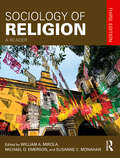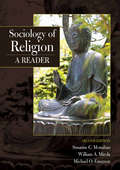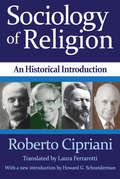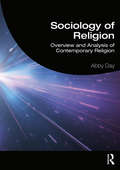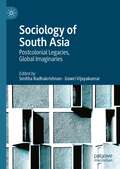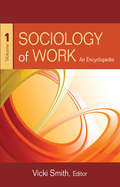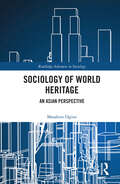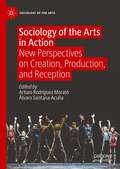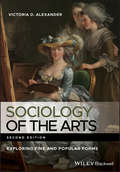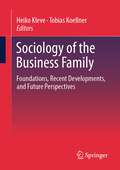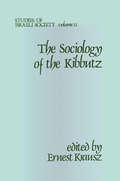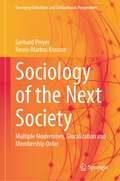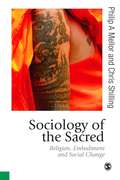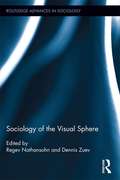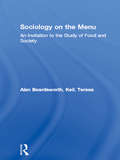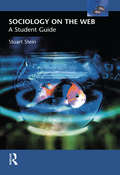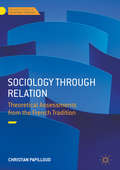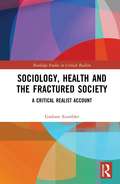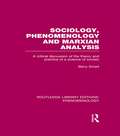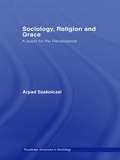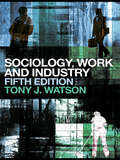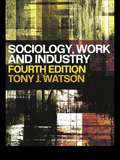- Table View
- List View
Sociology of Religion: A Reader
by Michael O. Emerson William A. Mirola Susanne C. MonahanSociology of Religion is a collection that seeks to explore the relationship between the structure and culture of religion and various elements of social life in the United States. This reader is an ideal standalone course text and can also serve as supplement to the text written by the same author team, Religion Matters (Routledge, 2010). Based on both classic and contemporary research in the sociology of religion, this new, third edition highlights a variety of research methods and theoretical approaches to studying the sociological elements of religion. It explores the ways in which religious values, beliefs and practices shape the world outside of church, synagogue, or mosque walls while simultaneously being shaped by the non-religious forces operating in that world.
Sociology of Religion: A Reader, CourseSmart (review only)
by Michael O. Emerson William A. Mirola Susanne C MonahanA reader that seeks to explore the relationship between the structure and culture of religion and various elements of social life in the U.S., Sociology of Religion: A Reader, 2e is ideal as either a standalone reader or supplement to the text written by the same author team, Why Religion Matters. Based on both classic and contemporary research in the sociology of religion, this reader highlights a variety of research methods and theoretical approaches. It explores the ways in which religious values, beliefs and practices shape the world outside of church, synagogue, or mosque walls while simultaneously being shaped by the non-religious forces operating in that world.
Sociology of Religion: An Historical Introduction
by Roberto CiprianiIn adopting an international perspective that goes beyond the conventional framework of western theology, this volume bridges the divide between European and North American scholars through its careful retrieval of their common theoretical and research interests. Cipriani provides a critical analysis of both classical thought and contemporary currents in this readable text, aimed at both experts and students. He has achieved a broadening in the scientific approach to the study of religion.
Sociology of Religion: An Historical Introduction (Annual Review Of The Sociology Of Religion Ser. #7)
by Roberto CiprianiSociology of Religion represents a documented introduction to the history of sociological thought as applied to religious phenomena. It examines both the substantive and functional definitions of religion that are more open, pluralistic, and not inscribed in a single explanatory horizon or within a single confessional perspective. The contributors' concerns are carefully written to show all sides of the argument. Roberto Cipriani argues for the simple definition that the sociology of religion is an application of sociological theories and methods to religious phenomena. Historically, close ties between sociology and the sociology of religion exist. The slow and uneven development of theory and methods affects the sociology of religion's development, but the latter has also benefited from increasing precision and scientific validity. Other sociological writers agree and disagree about different approaches. Some assume it is a militantly confessional or anti-confessional; others remain neutral within their work.
Sociology of Religion: Overview and Analysis of Contemporary Religion (Theology And Religion In Interdisciplinary Perspective Series In Association With The Bsa Sociology Of Religion Study Group Ser.)
by Abby DayThe first sociology of religion textbook to begin the task of diversifying and decolonizing the study of religion, Sociology of Religion develops a sociological frame that draws together the personal, political and public, showing how religion – its origins, development and changes – is understood as a social institution, influenced by and influencing wider social structures. Organized along sociological structures and themes, the book works with examples from a variety of religious traditions and regions rather than focusing in depth on a selection, and foregrounds cultural practice-based understandings of religion. It is therefore a book about ‘religion’, not ‘religions’, that explores the relationship of religion with gender and sexuality, crime and violence, generations, politics and media, ‘race’, ethnicity and social class, disease and disability – highlighting the position of religion in social justice and equality. Each chapter of this book is framed around concrete case studies from a variety of Western and non-Western religious traditions. Students will benefit from thinking about the discipline across a range of geographical and religious contexts. The book includes features designed to engage and inspire students: Up-to-date and comprehensive analysis of engaging and accessible material ‘Case Examples’: short summaries of empirical examples relating to the chapter themes Visually distinct boxes with bullet points, key words and phrases focusing on the context Questions suitable for private or seminar study Suggested class exercises for instructors to use Suggested readings and further readings/online resources at the end of each chapter Following a review and critique of early sociology of religion, the book engages with more contemporary issues, such as dissolving the secular/sacred binary and paying close attention to issues of epistemology, negotiations, marginalities, feminisms, identities, power, nuances, globalization, (post) (multiple) modernity (ies), emotion, structuration, reflexivity, intersectionality and urbanization. This book is essential reading for undergraduate and postgraduate students exploring the sociology of religion, religion and society, religious studies, theology, globalization and human geography.
Sociology of South Asia: Postcolonial Legacies, Global Imaginaries
by Smitha Radhakrishnan Gowri VijayakumarThis edited volume moves the study of South Asia to the center of sociological analysis, bringing together recent scholarship across sites in India, Sri Lanka, Nepal, and Pakistan, as well as in Ethiopia and the USA. This book situates the project of decolonizing the discipline within a rich transnational intellectual legacy and reveals how South Asia offers a uniquely generative site from which to rethink sociological practice. Recognizing local and global influences at their specific sites, the contributing authors highlight the historical ravages of colonialism and imperialism, modernization projects of the postcolonial era, and the kaleidoscopic ways in which gender, caste, class, and sexuality structure everyday life under neoliberalism today. The sociology of South Asia centers the voices and experiences of those marginalized by local and global systems of power in order to produce knowledge that advances interconnected projects of liberation.
Sociology of Work: An Encyclopedia
by Vicki SmithThe simple act of going to work every day is an integral part of all societies across the globe. It is an ingrained social contract: we all work to survive. But it goes beyond physical survival. Psychologists have equated losing a job with the trauma of divorce or a family death, and enormous issues arise, from financial panic to sinking self-esteem. Through work, we build our self-identity, our lifestyle, and our aspirations. How did it come about that work dominates so many parts of our lives and our psyche? This multi-disciplinary encyclopedia covers curricular subjects that seek to address that question, ranging from business and management to anthropology, sociology, social history, psychology, politics, economics, and health. Features & Benefits: International and comparative coverage. 335 signed entries, A-to-Z, fill 2 volumes in print and electronic formats. Cross-References and Suggestions for Further Readings guide readers to additional resources. A Chronology provides students with historical perspective of the sociology of work. In the electronic version, the comprehensive Index combines with the Cross-References and thematic Reader's Guide themes to provide robust search-and-browse capabilities.
Sociology of World Heritage: An Asian Perspective (Routledge Advances in Sociology)
by Masahiro OginoTaking mainly Japanese and other Asian case studies as examples, Ogino examines the motivations behind the preservation of objects and sites considered to be of cultural significance. Using mainly the perspectives of Japanese approaches to cultural heritage, the book critiques the European logic of cultural heritage enshrined by UNESCO. It contrasts a Western emphasis on monuments and sites, with an Asian emphasis on more intangible forms of heritage, which place less emphasis on a linear view of time. More practically, the authors also analyse the positive and negative impacts that UNESCO-listed status has had on sites in Asia, including Angkor Wat, Nagasaki, and Lijiang. Finally, they address fundamental questions about who gets to decide what counts as cultural heritage, and what the underlying rationale is for actively preserving heritage in the first place. This books is a thoughtful and provocative analysis of issues that will be of interest to sociologists, as well as scholars and students of cultural heritage.
Sociology of law: Towards a responsive theory
by Alfons BoraThis book presents a theory-historically grounded blueprint for a responsive sociology of law. It is based on the conviction, gained in research in the sociology of law, that sociology has more to say about law than its disciplinary surface reveals and than its self-descriptions allow. Responsive sociology of law, it is argued, can be formulated as a discourse of practice in the sociology of law based on the scientific autonomy of sociology. Responsiveness then denotes a form of interdisciplinarity that does not amount to the mere absorption of sociological insights by jurisprudence, but envisages a symmetrical arrangement of mutual relations.
Sociology of the Arts in Action: New Perspectives on Creation, Production, and Reception (Sociology of the Arts)
by Arturo Rodríguez Morató Alvaro Santana-AcuñaThis edited collection carries out an extensive coverage of the sociology of arts’ most characteristic thematic areas (production, creation, the artwork, and reception) across an important range of artistic fields, from the most traditional to the more unusual. It makes an argument for the theoretical creativity and empirical expansion that characterizes the study of contemporary sociology of the arts. Such creativity is present in the increasingly predominant approach to a sociology of the arts in action, in all areas of inquiry within the discipline. The range of theoretical paradigms evoked is rich, analysing several of the most important theoretical frameworks currently handled in the discipline (Bourdieu, Becker, Peterson, ANT), and combining them with the works of many other influential contemporary specialists (De Nora, Hennion, Lamont, Menger and Born et al.). The book also establishes links to less known theoretical frameworks and some from different fields including economic sociology,microsociology, ethnomethodology, semiotics, and cultural history. The volume argues that Spanish-speaking scholars are now at the forefront of new developments in the field of the sociology of the arts, and is the first effort to gather research by these influential Spanish-language scholars in a single volume for an English-language audience.
Sociology of the Arts: Exploring Fine and Popular Forms (Sociology Of The Arts Ser.)
by Victoria D. AlexanderExplains the key concepts, theories, and studies in the sociology of the arts—the fully updated new edition of the classic textbook Sociology of the Arts is a comprehensive yet accessible review of sociological approaches to studying the fine, popular, and folk arts. Integrating scholarly literature, theoretical models, and empirical studies, this authoritative textbook provides balanced coverage of a broad range of essential topics—enabling a deeper understanding of the field as a whole. Throughout the text, numerous real-world case studies reinforce key concepts, stimulate classroom discussion, and encourage students to contemplate abstract theoretical issues central to the relationship between art and society. Now in its second edition, this bestselling volume features fully revised content that reflects the most recent literature and research in the field. New discussion on the production and the consumption of culture are complemented by fresh perspectives on changes in the social world such as the rise of the internet and digital media. Updated chapters offer insights into social boundaries and embodiment in the arts, emplacement, materiality, the social construction of art and aesthetics, and more. Exploring how art is created, distributed, received, and consumed, this textbook: Explores both classic work and new approaches in the sociology of the arts Features case studies and discussion questions on art forms including popular music, film, romance novels, visual arts, and classical music Discusses the meaning of artistic objects and why interpretations of art vary Examines the ways art intersects with race, gender, sexuality, and class Includes photographs, tables and figures, and a comprehensive reference list Written by a leading scholar in the field, Sociology of the Arts: Exploring Fine and Popular Forms, Second Edition is an ideal textbook for advanced undergraduate and graduate courses on sociology of art and culture, media studies, anthropology of art, arts management, and the social history of art, and is a useful reference for established scholars studying any aspect of sociology of the arts.
Sociology of the Business Family: Foundations, Recent Developments, and Future Perspectives
by Tobias Koellner Heiko KleveThe entrepreneurial family has hardly been a topic of family sociology so far. Precisely because more than two-thirds of all companies are family-run, it is surprising that sociology has not yet discovered the entrepreneurial family as a field of research. With this book, it is made the content of systematic family sociological reflections.A central point of departure for theorizing and research on entrepreneurial families is that this form of family has to deal with special social challenges because it structurally combines, mixes, and couples two social spheres that are generally pulled apart in the course of the modernization of society, namely families as part of the private life world and companies as the formal organization of the economic system.This book is a translation of an original German edition. The translation was done with the help of artificial intelligence (machine translation by the service DeepL.com). A subsequent human revision was also carried out by the authors and a native speaker.
Sociology of the Kibbutz
by ERNEST KRAUSZ; DAVID GLANZThis is the second volume of the publication series of the Israeli Sociological Society, whose object is to identify and clarify the major themes that occupy social research in Israel today. Studies of Israeli Society gathers together the best of Israeli social science investigation, which was previously scattered in a large variety of international jour-nals. Each book in the series is in-troduced by integrative essays.The contents of volume two focus on the sociology of a unique Israeli social institution—the kibbutz. Kib-butz society constitutes an impor-tant laboratory for the investigation of a variety of problems that have been of perennial concern to the social sciences. Topics in this volume include relevant contem-porary issues such as the dynamics of social stratification in a "classless" society, the function and status of the family in a revolutionary society, relations between generations, industrializa-tion in advanced rural communities, and collective economies versus the outside world. The questions of the concept and development of the kib-butz, social differentiation and socialization, and work and produc-tion within the kibbutz possess a significance far beyond their im-mediate social context. Does the kibbutz offer a model for an alter-native, communal lifestyle for the modern world? How has the kibbutz changed over the past decadeswithin the context of a rapidly modernizing Israeli society?Emphasizing the "nonfailure" of the kibbutz experiment and con-trasting it with many socialist, cooperative, and communal ex-periments that clearly did fail, Martin Buber, in his analysis, attributes this success to the kib-but/'s undogmatic character, its ability to adapt structures and in-stitutions to changing conditions, while preserving its essential values and ideals.This volume presents an excellent review of the social research under-taken on the kibbutz in the past decades, and provides an introduc-tion to the growing scientific literature on the kibbutz.Contributors: Melford E. Spiro, Menachem Rosner, Martin Buber, Joseph Ben-David, Daniel Katz, Naftali Golomb, Erik Cohen, Arye Fishman, Michael Saltman, S.N. Eisenstadt, Eva Rosenfeld, Amitai Etzioni, Ephraim Yuchtman, Eliezer Ben-Rafael, Nissim Cohen, Yonina Talmon-Garber, Joseph Shepher, Lionel Tiger, Edward C. Devereux, Reuben Kahane, Ivan Vallier, David Barkin, John W. Bennet, Yehuda Don, Uri Leviatan, Eliette Orchan, Shimon Shur and David Glanz.
Sociology of the Next Society: Multiple Modernities, Glocalization and Membership Order (Emerging Globalities and Civilizational Perspectives)
by Gerhard Preyer Reuss-Markus KrausseThis innovative volume provides insight into the vast changes in societies now and in the near future, and highlights the need for a new sociological approach to analyse these changes. It particularly reviews and critiques existing theories of globalization and analyses how global changes affect all subsystems of social membership systems: the scientific, academic, legal and political systems. The authors propose a new theoretical paradigm in sociology to analyse this “next society”. The book studies emergent communication structures between these systems and looks at the concept of membership as a new research area in the study of the next society. In this context, it particularly assesses the problems of further modernization of Chinese society, and the directions of this modernization.This book is of interest to researchers and students of social theory, globalization studies, theory of evolution, and those studying modern Chinese society.
Sociology of the Sacred: Religion, Embodiment and Social Change (Published in association with Theory, Culture & Society)
by Philip A Mellor Chris Shilling"About time! Two key experts in the field remind us of the significance and power of religion as bio-political and bio-economic." - Beverley Skeggs, Goldsmiths, University of London "A welcome addition to a continuing body of work by two distinguished theorists of religion." - Grace Davie, University of Exeter "Mellor and Shilling cement their place at the pinnacle of the contemporary sociological theorisation of religion and the sacred. If sociological work is going to have any future it is to be found in the inspiration and excitement of this sophisticated and intelligent book." - Keith Tester, University of Hull "This book is ambitious, refreshing and rewarding. It offers the best available analysis of the complex interlacing of the sacred, religion, secularization and embodied experience." - James A. Beckford, University of Warwick Drawing on classical and contemporary social theory, Sociology of the Sacred presents a bold and original account of how interactions between religious and secular forms of the sacred underpin major conflicts in the world today, and illuminate broader patterns of social and cultural change inherent to global modernity. It demonstrates: How the bodily capacities help religions adapt to social change but also facilitate their internal transformation That the ‘sacred’ includes a diverse range of phenomena, with variable implications for questions of social order and change How proponents of a ‘post-secular’ age have failed to grasp the ways in which sacralization can advance secularization Why the sociology of the sacred needs to be a key part of attempts to make sense of the nature and directionality of social change in global modernity today. This book is key reading for the sociology of religion, the body and modern culture.
Sociology of the Sacred: Religion, Embodiment and Social Change (Published in association with Theory, Culture & Society)
by Professor Chris Shilling Philip A Mellor"About time! Two key experts in the field remind us of the significance and power of religion as bio-political and bio-economic." - Beverley Skeggs, Goldsmiths, University of London "A welcome addition to a continuing body of work by two distinguished theorists of religion." - Grace Davie, University of Exeter "Mellor and Shilling cement their place at the pinnacle of the contemporary sociological theorisation of religion and the sacred. If sociological work is going to have any future it is to be found in the inspiration and excitement of this sophisticated and intelligent book." - Keith Tester, University of Hull "This book is ambitious, refreshing and rewarding. It offers the best available analysis of the complex interlacing of the sacred, religion, secularization and embodied experience." - James A. Beckford, University of Warwick Drawing on classical and contemporary social theory, Sociology of the Sacred presents a bold and original account of how interactions between religious and secular forms of the sacred underpin major conflicts in the world today, and illuminate broader patterns of social and cultural change inherent to global modernity. It demonstrates: How the bodily capacities help religions adapt to social change but also facilitate their internal transformation That the ‘sacred’ includes a diverse range of phenomena, with variable implications for questions of social order and change How proponents of a ‘post-secular’ age have failed to grasp the ways in which sacralization can advance secularization Why the sociology of the sacred needs to be a key part of attempts to make sense of the nature and directionality of social change in global modernity today. This book is key reading for the sociology of religion, the body and modern culture.
Sociology of the Visual Sphere (Routledge Advances in Sociology #91)
by Dennis Zuev Regev NathansohnThis collection of original articles deals with two intertwined general questions: what is the visual sphere, and what are the means by which we can study it sociologically? These questions serve as the logic for dividing the book into two sections, the first ("Visualizing the Social, Sociologizing the Visual") focuses on the meanings of the visual sphere, and the second ("New Methodologies for Sociological Investigations of the Visual") explores various sociological research methods to getting a better understanding of the visual sphere. We approach the visual sphere sociologically because we regard it as one of the layers of the social world. It is where humans produce, use, and engage with the visual in their creation and interpretation of meanings. Under the two large inquiries into the "what" and the "how" of the sociology of the visual sphere, a subset of more focused questions is being posed: what social processes and hierarchies make up the visual sphere? How various domains of visual politics and visuality are being related (or being presented as such)? What are the relations between sites and sights in the visual research? What techniques help visual researcher to increase sensorial awareness of the research site? How do imaginaries of competing political agents interact in different global contexts and create unique, locally-specific visual spheres? What constitutes competing interpretations of visual signs? The dwelling on these questions brings here eleven scholars from eight countries to share their research experience from variety of contexts and sites, utilizing a range of sociological theories, from semiotics to post-structuralism.
Sociology on the Menu: An Invitation to the Study of Food and Society
by Alan Beardsworth Teresa KeilSociology on the Menu is an accessible introduction to the sociology of food. Highlighting the social and cultural dimensions of the human food system, from production to consumption, it encourages us to consider new ways of thinking about the apparently mundane, everyday act of eating. The main areas covered include:* The origins of human subsistence and the development of the modern food system* Food, the family and eating out* Diet, health and the body image* The meanings of meat and vegetarianism.Sociology on the Menu provides a comprehensive overview of the literature, particularly helpful in this interdisciplinary field. It focuses on key texts and studies to help students identify major concerns and themes for further study. It urges us to re-appraise the taken for granted and familiar experiences of selecting, preparing and sharing food and to see our own habits and choices, preferences and aversions in their broader cultural context.
Sociology on the Web: A Student Guide
by Stuart SteinSociology on the Web is directed at those who want to be able to access sociology Internet resources quickly and efficiently without needing to become IT experts. The emphasis throughout is on the location of high quality sociology Internet related resources likely to be useful for learning, teaching and research, from among the billions of publicly accessible Web pages.In addition to extensive coverage of topics relating to the efficient location of files and Web sites, Part III provides a substantial and annotated list of high quality resources likely to be of use to students of sociology.The work is structured so that it will be found useful by both beginners and intermediate level users, and be of continuing use over the course of higher education studies.
Sociology through Relation: Theoretical Assessments from the French Tradition (Palgrave Studies in Relational Sociology)
by Christian PapilloudThis book delivers a top-down understanding of relation as a macro-phenomenon in society. This understanding rests on the reconstruction of an ongoing debate in the French tradition about the purpose of a relational perspective in sociology and the social sciences. Christian Papilloud analyzes the cardinal steps of this debate, which historically relate to the concept of solidarity, expressing an ideal of social cohesion through relationships between personal and non-personal actors. In social theory, it is well-known that solidarity refers to Emile Durkheim. But little is known about the controversies generated in relation to the purpose of a relational perspective in sociology. Papilloud reconstructs and follows the most important of these controversies in a comparative perspective, beginning with Emile Durkheim and Gaston Richard on solidarity, Richard and Marcel Mauss on sacrifice and magic, Mauss and Pierre Bourdieu on gift and social positions, Bourdieu and Bruno Latour on the objects of exchanges and institutions, and Latour and Durkheim on reciprocity and control. These comparisons give shape to a theoretical framework for a 'sociology through relation.
Sociology, Health and the Fractured Society: A Critical Realist Account (Routledge Studies in Critical Realism)
by Graham ScamblerIt is now accepted that many of the determinants of health and health care are social. This volume offers a philosophical and theoretical frame within which the nature and extent of this might be optimally examined. The analysis is rooted in Roy Bhaskar’s basic and dialectical critical realism, although it draws also on the critical theory of Jurgen Habermas. It purports to provide an ontologically and epistemologically grounded comparative sociology of contemporary health and health care in the twenty-first century. Carrying a fourfold agenda, the volume sets out a dialectical critical realist frame for a comparative sociology of health and health care; it clarifies sociology’s potential and limitations; it suggests a research programme and a series of questions for investigation; and it offers an argument for an action sociology embedded in a dialectical theory of transformative action. This volume will be of interest to students and scholars in the areas of philosophy, sociology and critical realism, as well as those working in health and social care.
Sociology, Phenomenology and Marxian Analysis: A Critical Discussion of the Theory and Practice of a Science of Society (Routledge Library Editions: Phenomenology)
by Barry SmartSociology is an established academic discipline but there has been continuing debate over its status as a science and the nature of its subject matter. This led to the emergence of a phenomenological sociology and to critiques of positivist sociology. This critical reappraisal of the relevance of Marxian analysis for a science of society shows how these developments within sociology have had their counterpart in Marxism. The author analyses the status of Marx’s work and the Marxist ‘tradition’ in sociology. He focuses upon those concerns which are common to both Marxian analysis and sociology – the question of subjectivity; the nature of social reality; and the dialectical relationship of the ‘doing’ or practice of a science of society to the social world within which such social analyses are situated. Originally published in 1976.
Sociology, Religion and Grace (Routledge Advances in Sociology)
by Arpad SzakolczaiThis book offers a sociological analysis of the Renaissance, focusing on the concept of grace, and the unity that exists between its various meanings: theological, anthropological (gift-giving, Mauss; and sociability, Simmel), and aesthetical (beauty and gracefulness). Since the seminal work of Max Weber rooted capitalism, and thus the modern world, in the Protestant ethic, interest in the Renaissance among social scientists has been minimal. However, this book argues that the heart of the European tradition lies in a series of renascences, going back to Minoan Crete and its rebirth in classical Greek civilisation, during an earlier global age. The Renaissance forged a novel unity between the Judaic-prophetic and Minoan-Athenian traditions, renewing grace in all its aspects and thus revitalising Europe. This attempt tragically failed and the modern world is the outcome of this explosion. All this has vital contemporary relevance, as the classical European tradition is still a unique source suggesting a way out of the spiralling logic of globalisation.
Sociology, Work and Industry: Fifth edition
by Tony WatsonThis popular text effectively explains and justifies the use of the sociological imagination to understand the nature of institutions of work, occupations, organizations, management and employment, and how they are changing in the twenty-first century. With outstanding breadth of coverage, it provides an authoritative overview of both traditional and emergent themes in the sociological study of work; explains the basic logic of sociological analysis of work and work-related institutions and provides an appreciation of different theoretical traditions. It considers: the direction and implications of trends in technological change, globalization, labour markets, work organization, managerial practices and employment relations the extent to which these trends are intimately related to changing patterns of inequality in modern societies and to the changing experiences of individuals and families the ways in which workers challenge, resist and make their own contributions to the patterning of work and shaping of work institutions. New features include an easy to read layout, key issues questions, mini case studies, chapter summaries, and a fantastic Companion Website which is packed full of useful resources (for students and teachers). All of these elements – and much more – provide the reader with a text unrivalled in the field.
Sociology, Work and Industry: Fifth edition
by Tony WatsonIn the fourth edition of this successful and popular text, Tony Watson explains how the discipline of sociology contributes to our wider understanding of the variety of work practices and institutions, which exist in modern society. The new edition outlines both what has been achieved historically and what is currently being achieved by the sociological study of work, as well presenting a range of concepts, models and other theoretical ideas that students and researchers can apply to the study of work. Subjects covered include:* how working patterns have changed, and continued to change since the industrial revolution * work organizations* innovations in the structuring of work activities at the enterprise level* the occupational aspects of the organization of work in changing societies* how people experience and cope with the pressures, insecurities and inequalities of a restructured world of work* how challenge and resistance influence the shaping of work in an ever-changing world.Fully updated throughout, this book includes an all-new chapter on the distinctiveness of the sociological perspective along with guidance on the research and analysis of work. It will be essential reading for anybody studying the sociology of work and organizations.
